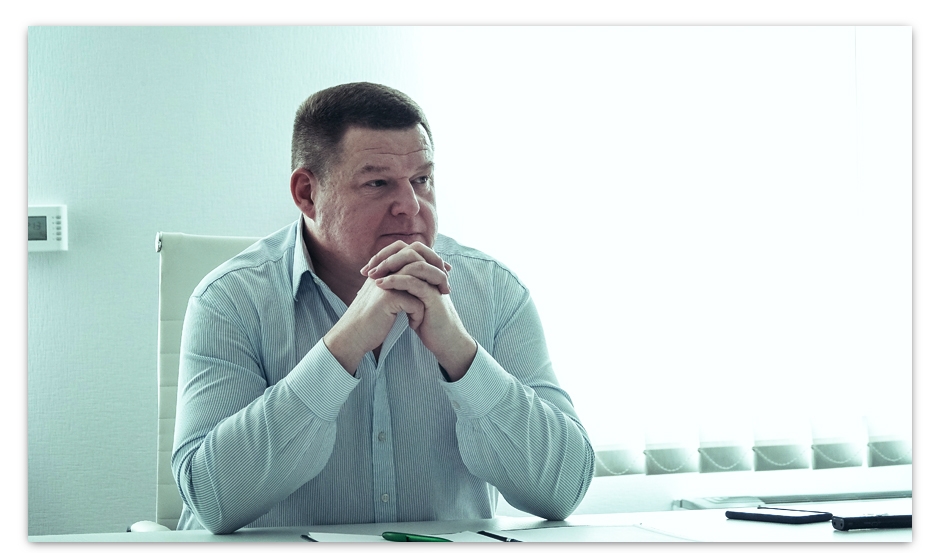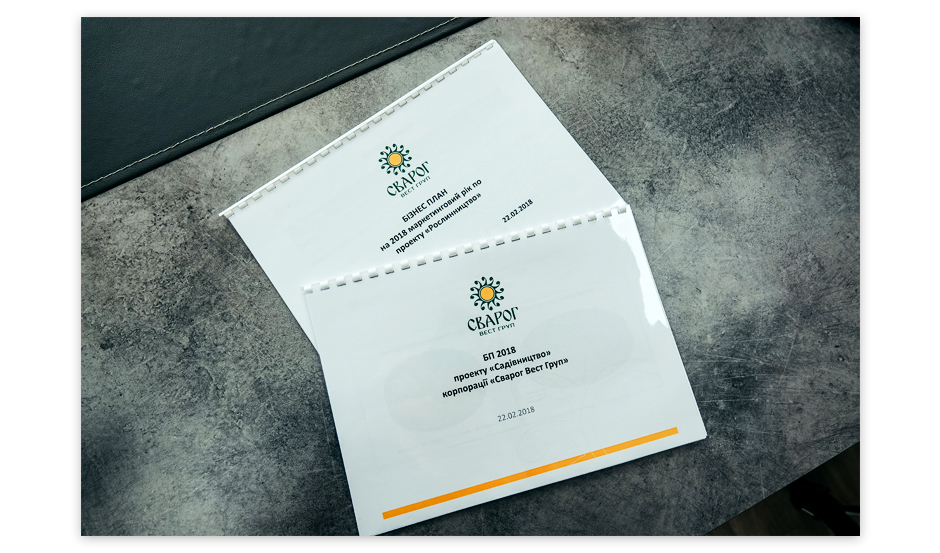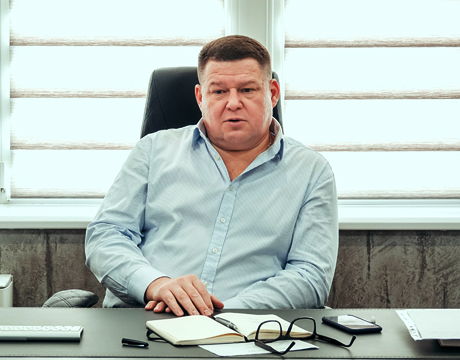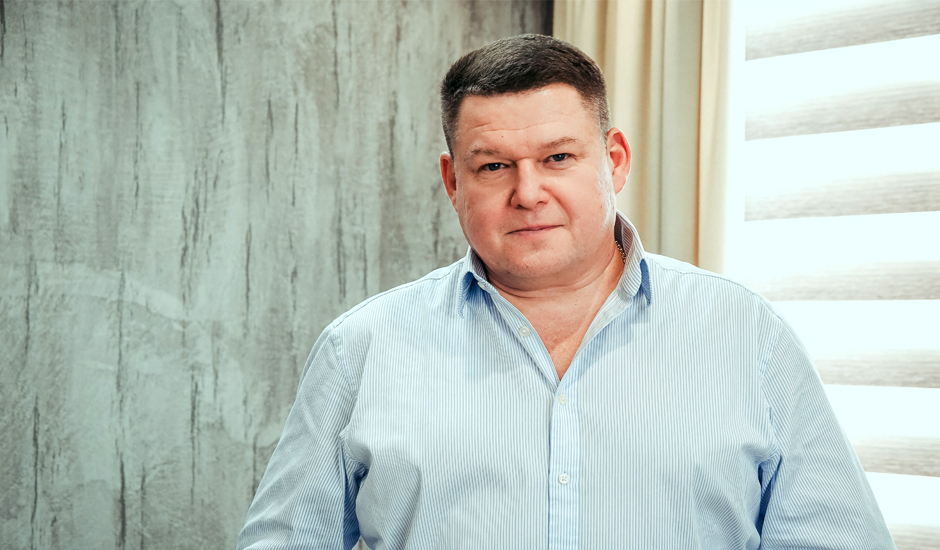Interview
Mykola Agarkov:
The Only Sphere Where Dictatorship Is Present in Svarog Is the Technological One
The Only Sphere Where Dictatorship Is Present in Svarog Is the Technological One
12.03.2018 Konstantin Tkachenko
Last year Svarog West Group underwent a number of strategic and structural changes. The company reevaluated its mission, corporate and production processes and promised to continue strengthening its positions in the market. In this exclusive interview, the Chairman of the Board of Directors Mykola Agarkov talks about the results of the last year and plans for the future season, "dictatorship of technology", organic farming and how the company reacted to "the wind of change."

Mykola Agarkov
Mr. Agarkov, this is the new office of the corporation. While choosing a new location for the office, did you consider moving it away from Shepetivka?
No, it didn't even cross my mind. We started in Shepetivka; this is our historic center. Besides, our corporate interests spread almost all over the Shepetivka district. Moreover, this town is equidistant from three regional centers: Zhytomyr, Khmelnitsky and Rivne. It lies at the crossroads of motorways and railways. It is a very comfortable location in all respects. So, Shepetivka it is.
To narrow the focus of the conversation, could you tell us about the results of the last year, what was the last year like for the company?
It wasn't easy. Although, there's hardly an easy year for the agricultural business. There are always certain nuances to address and correct. The year was difficult and interesting in equal measure. Thank God, it is over and we managed to fulfill the production tasks and reach the financial goals we had outlined in our business plan for the year.
You mentioned some nuances. Did you mean the changes in management structure?
Not just that. There were also unfavorable weather conditions and various production challenges. However, it is true that management restructuring was the major issue. For a year now the company has been managed by the Board of Directors. This form of management is welcome by our foreign business partners and potential investors. Today the Board of Directors consists of six executive directors and an independent director. All of them are experts in their fields. It has added a bit more of red tape and formalism to management but it also brought about good results.
Related story: Svarog 2.0: Agroholding in a New Format
Not long ago UkrLandFarming announced that after having reached a great level of centralization they decided to hand over the reins to the regions. Do you think Svarog may choose the same strategy?
You see, Svarog is not rigidly centralized. Broadly speaking, you don't need to address the top-management to make a management decision. Each manager is empowered to make management decisions in his area of expertise. Everybody has a certain freedom of decision making and a certain degree of delegated authority and responsibility. There is no dictatorship in our management.
The only form of dictatorship we allow is that of technology. We believe it is the only thing that can help save, develop or build a business these days. For instance, technology roadmaps outline the ultimate goals with regard to weather conditions and time limits. What is outlined there is a must, the rest is up to the manager, his executive competence, authority and responsibility.
The only form of dictatorship we allow is that of technology. We believe it is the only thing that can help save, develop or build a business these days. For instance, technology roadmaps outline the ultimate goals with regard to weather conditions and time limits. What is outlined there is a must, the rest is up to the manager, his executive competence, authority and responsibility.
Mykola Agarkov: The Only Sphere Where Dictatorship Is Present in Svarog Is the Technological One
The wind of change
How did Svarog team take the changes?
That's a difficult question to answer. I wish I could say that everybody was outrageously happy about it. Changes are always difficult to accept. But I believe that sooner or later (given we have made the right choice) the changes will bear fruit for all of us and then everybody will be happy with them.
What I can say for sure is that there were no groundbreaking staff changes. No more changes than we usually have each year. Besides, staff changes are natural for any company. At the end of the day, we all age and the company needs young blood. I am happy to admit that there come energetic and proactive youth in our place. They have their own vision and approaches.
What I can say for sure is that there were no groundbreaking staff changes. No more changes than we usually have each year. Besides, staff changes are natural for any company. At the end of the day, we all age and the company needs young blood. I am happy to admit that there come energetic and proactive youth in our place. They have their own vision and approaches.
Did the restructuring help improve relationships with counterparties and partners?
Definitely. A good example is a USD 5 mln prepaid forward contract we signed with Bunge. It is the first and the biggest contract of such scale they signed with someone in Ukraine. They have never done that before.
The contract is also unique because it presupposes production risk management mechanisms when the price of the product may change depending on the end yield compared to the average yield. This way the price may increase to compensate for the low yields. The mechanism of price-setting is also unique. We are free to set price depending on the global market trends. All of it is in the contract.
We also have a special relationship with Soufflet Agro Ukraine. We grow brewing barley for this company. In fact, our strategy is to tailor our product to the customer, the customer whom we have known for a long time and well.
The contract is also unique because it presupposes production risk management mechanisms when the price of the product may change depending on the end yield compared to the average yield. This way the price may increase to compensate for the low yields. The mechanism of price-setting is also unique. We are free to set price depending on the global market trends. All of it is in the contract.
We also have a special relationship with Soufflet Agro Ukraine. We grow brewing barley for this company. In fact, our strategy is to tailor our product to the customer, the customer whom we have known for a long time and well.
It is only logical to assume that the changes were needed because there were some shortcomings in the organization of work, task setting and management, weren't there?
There is no definite answer to that. I can't say that things have only started working properly under my management. Today we focus more on setting targets. Saying that someone is going to do something tomorrow will not do. Reporting on a mission completion, tasks and schedules has become more formal and controlled. Timing is now of the essence.
Could you give an example of how that applies to an agronomist?
In many respects, it starts with an agronomist. To begin with, we spell out what we are to grow in our business plan. It is defined by market conditions, crop rotation and smart agribusiness. You can't sow the same crop in the same field each year. True, there are farms in Argentina and the US where they have been growing corn for six generations. We don't know how to do that and we don't aim to achieve that.
Getting back to the agronomist. When the crop is defined, the rest is done according to the technological roadmap. We value the marginality of the crop, not its yields. It is not always clever to rely on crop yields. When we do something, we do it with a clear goal in mind. Right now, Khmelnitsky region leads in crop yields in Ukraine indeed. However, if we don't bring marginality into the equation, we won't achieve the desired result. Of course, there are plans on crop yields that agrarians need to meet as well.
Getting back to the agronomist. When the crop is defined, the rest is done according to the technological roadmap. We value the marginality of the crop, not its yields. It is not always clever to rely on crop yields. When we do something, we do it with a clear goal in mind. Right now, Khmelnitsky region leads in crop yields in Ukraine indeed. However, if we don't bring marginality into the equation, we won't achieve the desired result. Of course, there are plans on crop yields that agrarians need to meet as well.
Related story: Serhii Filiuk: I Have Known Svarog Since Its Inception
When we talk about crop marginality, we primarily mean optimal funds allocation. Roughly speaking, it means to buy the right product for the reasonable price. It is not solely the agronomist's responsibility. When we say "crop yields", we know that agronomists can only achieve this if they have seed, quality fertilizers and opportunities for timely fertilization.
That is why the business needs to be balanced so that minimum costs brought about maximum results. We have managed to balance it. We efficiently plan expenditure and duly pay taxes, and transfer payment for our loans and lease operations. The last year's achievements prove that we have chosen the right strategy. We managed to cut down costs and gain more profit.
That is why the business needs to be balanced so that minimum costs brought about maximum results. We have managed to balance it. We efficiently plan expenditure and duly pay taxes, and transfer payment for our loans and lease operations. The last year's achievements prove that we have chosen the right strategy. We managed to cut down costs and gain more profit.
Did cutting costs involve economizing on material and technical resources, plant protection products and seeds or was it about looking for cheaper alternatives?
We seem to have a different understanding of "cost saving". Frankly speaking, I don't think it is wise to try economizing on essentials in business. When we talk about cutting general costs, it's one thing. However, when we talk about technology, and we do remember about the dictatorship of technology [Ed: he says smiling] can be no economizing. No economizing on salaries, plant protection, fertilizers, quality seeds. Those who do economize on that just fool themselves. What I mean by saving costs is the best use of resources not cutting down on them.
A good harvest year
Were there any changes to crop patterns last year?
There were no profound changes to crop patterns. The basic variety of crops is the same: high oleic sunflower, soybean, winter and spring wheat, brewing barley, sugar beet, and a number of niche crops. If there were any minor changes, they were minimal and caused by crop rotation and other agricultural requirements.
Which crops produced the best yields?
We achieved large yields of all crops, not just the main ones. Our own laboratory for soil analysis and a differentiated system of fertilization guarantee high yields. We don't introduce new seeds before we make sure they are well adjusted to our conditions. For instance, we are currently testing 58 new crop types in our test field in the Northern region of the company. Owing to this approach, we harvested a record yield of 8 t/ha of spring barley in 2017. In 2018 we plan to sow over 3 thousand ha of this crop.
Related story: Precision Agriculture: A Trick Up an Agrarian's Sleeve
All in all, the harvest of 2017 was not easy. Especially that of sugar beet which gross weight yield amounted to 60.9 t/ha. Our major crop yields exceeded those around the country. For example, winter wheat yield was 8.9 t/ha which was the highest yield rate in Khmelnitsky region.
Which crops do you consider the most promising and profitable for a company of your scale?
oybean is still in high demand, so compared to the last season we will increase the area under this crop. One of the most profitable crops is high oleic sunflower. We grow two varieties of the crop: mid-season hybrid high-yield one (MAS) and mid-season high-oleic acid one (Tutti, Syngenta). In 2017, we planted 5.5 thousand ha of the crop, this year we plan to increase its part to 90%.

What about organic farming? Is it still a priority?
Of course it is. Agricultural markets are changing and organic farming is the most current trend. Recently I've visited a big exhibition on the topic in Germany. There were representatives of agribusinesses from all over the world: Peru, Argentina, the US, Canada, India etc. The global market is moving towards organic products because there is a part of the world population that wants organic products. The exhibition shows that today it is even possible to produce organic palm oil.
As you know, Svarog is developing in that direction. Some of our lands are certified for organic farming. We are establishing contacts with companies that produce organic fertilizers.
Naturally, it leads to developing a whole infrastructure for storage, treatment and perhaps even processing of some of the organic product. You may consider it a long-standing target of Svarog Corporation. We might even evolve to retail if the processing unit might eventually allow us reaching the supermarket shelves in Ukraine, Poland, the US. The geography will depend on what we'll be able to offer.
As you know, Svarog is developing in that direction. Some of our lands are certified for organic farming. We are establishing contacts with companies that produce organic fertilizers.
Naturally, it leads to developing a whole infrastructure for storage, treatment and perhaps even processing of some of the organic product. You may consider it a long-standing target of Svarog Corporation. We might even evolve to retail if the processing unit might eventually allow us reaching the supermarket shelves in Ukraine, Poland, the US. The geography will depend on what we'll be able to offer.
Your company doesn't seem to blindly follow mainstream trends. The fact that you want to invest in organic farming means you see the potential of this market, right?
Yes. We see the growth and potential of this market. Like I said, there will always be a part of the world population wishing to buy eco-friendly, healthy products aiming for eternal life etc.
Are you one of these people?
Well, I am all for the healthy lifestyle in general. I think a person needs to be aware of what he consumes. That concerns not only food, but water, air and the rest. That is why Svarog West Group pays due attention to the environment. We develop environmental programs and projects. We want our people and future generation to live in environmentally friendly Ukraine.
Does it reflect in your production processes?
In many ways. We reduce the use of natural gas and change it for organic products. For example, in our dryers. We switch to organic products not only because it helps to economize on gas. When we use fossil fuel, we maintain the balance of the ecosystem.
What percentage of your facilities uses fossil fuel?
Not much yet. I think it is around 10% now but we plan to increase that to 100%.
Profitable livestock breeding
Because of its alleged unprofitability, many agroholdings view livestock breeding as a social appendage of a company. Have you made a profit in this sphere of business?
2017 was not bad for livestock breeding. To a great extent, it was due to the considerable rise in the milk price. Overall, our livestock breeding was not extremely profitable in 2017 but it wasn't negative either. Our breeders made some modest profit.
I think this positive tendency will only improve owing to the changes in the milk market. People review their attitude to the product; they no longer want lactiferous products, they want quality dairy products. I believe dairy is becoming a promising area these days.
Today the company owns 10 modern milk production complexes and two enterprises Podilskyi Gospodar and ATZT Myrne with 9 thousand heads of cattle including 4.3 thousand heads of dairy cows.
I think this positive tendency will only improve owing to the changes in the milk market. People review their attitude to the product; they no longer want lactiferous products, they want quality dairy products. I believe dairy is becoming a promising area these days.
Today the company owns 10 modern milk production complexes and two enterprises Podilskyi Gospodar and ATZT Myrne with 9 thousand heads of cattle including 4.3 thousand heads of dairy cows.
How much should a liter of milk cost to bring at least minimal profit?
I think this year's average price already brings UAH 8-9 of profit.
How were things for the livestock breeding of the Corporation last year?
Less profitable than this year. The profits bordered on negative. Today we see that it is possible for the company to make money in that field as well. We've found out some ways to make it work for us.
Could you tell us more about those ways?
You won't believe it but they mainly concern management. You may achieve positive results under the right management: increased control and the aforementioned dictatorship of technology. Low quality feed, outdated techniques, a matter-of-fact attitude to the main means of production – the cow – may lead to low profits. Cows should be loved, cared for, talked to etc.
Land and people
Mr. Agarkov, are there plans to increase the land bank of the Corporation?
Yes, we do have such plans. We don't have a specific figure in mind, though. 100, 300 or 500 thousand ha or more. There is no limit. As long as we see that we can manage that much land we will continue expanding.
There are different opinions regarding the maximum amount of land that is possible to manage. What is your opinion on the matter?
When we look at it from that angle, it seems like we talk about something one can possibly eat or drink. There may be a different approach. Let's say one can possibly manage 100 ha but not 300 ha. What should he do? Employ two other people he trusts. You can scale this up to hundred thousand ha. It is important to trust those people you work with, to teach them to think like you do, and to learn to work as a team. If you have such a team, you can expand your land property unlimitedly.
Speaking of land, I can't but ask you about the moratorium on land sale. Should it be abolished in your opinion?
I believe there's too much speculation around this topic. What I know for sure is that land is the main means of production for agrarians. If an agrarian is not sure he fully owns the land, it undermines the foundations of the agricultural business.
It is common knowledge that there are many cunning realtors who help some corporations increase their land property by making others get rid of it. Have they tried to approach Svarog?
We are not unique in that respect and we have faced that problem. There will always be people who will try to deprive you of some land and then try and sell it to you for a higher price. The problem will last until there are law and order in the land market.
The government should control the land market. Not the state, which means a coat of arms and an anthem for me, but the government, which yields real power. We need to work out a mechanism that will guarantee land owners, i.e. all Ukrainian citizens, that their property is correctly evaluated and arranged for further operations.
The government should control the land market. Not the state, which means a coat of arms and an anthem for me, but the government, which yields real power. We need to work out a mechanism that will guarantee land owners, i.e. all Ukrainian citizens, that their property is correctly evaluated and arranged for further operations.

It is my firm belief that Ukrainian land is undervalued. In dealing with our shareholders, we consciously overpay at times. We believe that if we made a profit so did our shareholders. We don't limit the amount of our pay by the terms of the contract. I mean, we may share up to 20% of profit with our shareholders even though we are obliged to pay only 8-10% or 11% by the contract.
Are there any problems when it comes to the payment of rents?
The company pays in cash or goods (wheat, corn, sugar, honey) for the land. The lessors choose the form of payment themselves. We pay according to the terms of the contract, which spells out the percentage of the annual payment. Over the last three years, the payment increased 2.5 times. As for the problems, there were some issues with payment transfers in 2016; there were delays in payments until February 2017. Last year we solved those problems and raised the payout rates in both cash and goods to maintain partnership with our lessors.
What are the prospects for the company development in 2018?
Our major objectives have always been and will be the modernization of technical resources and organic farming. These areas are profitable, environmentally friendly and efficient. Our experts of the precision farming branch constantly work on innovative technological solutions to increase yield rates and minimize costs. Organic farming produces healthy and wholesome products which gain increasing popularity with consumers.
It is equally important for us to provide systemic education to our employees. We form a powerful team by training various experts and managers of different levels.
Personally, I see the company as a powerful agroholding aimed at building a modern agricultural business together with mechanics, agronomists, experts and executives who aspire for self-improvement and invest their enthusiasm and inspiration in the work of the great company. We are lucky to have such people.
It is equally important for us to provide systemic education to our employees. We form a powerful team by training various experts and managers of different levels.
Personally, I see the company as a powerful agroholding aimed at building a modern agricultural business together with mechanics, agronomists, experts and executives who aspire for self-improvement and invest their enthusiasm and inspiration in the work of the great company. We are lucky to have such people.

